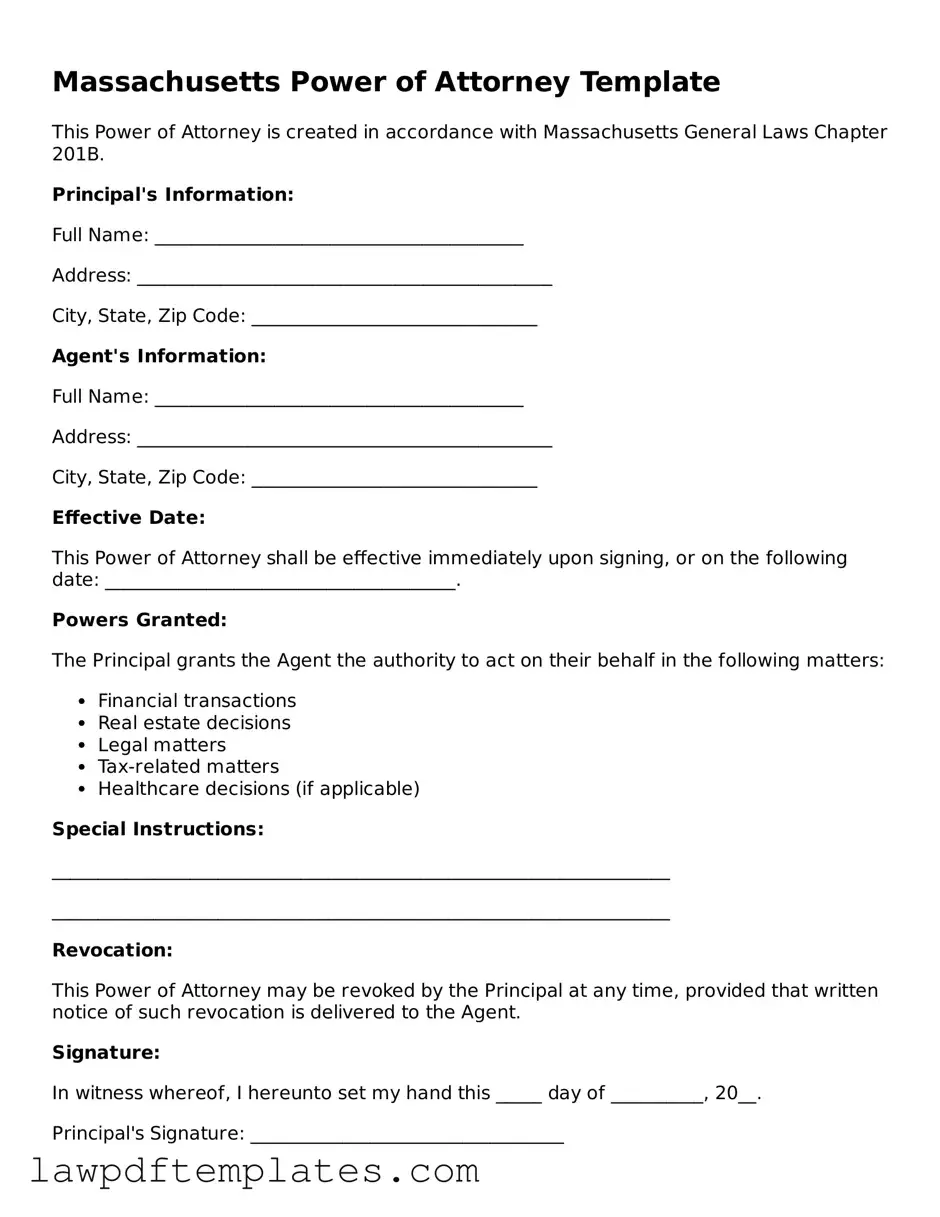Free Power of Attorney Template for the State of Massachusetts
Form Breakdown
| Fact Name | Description |
|---|---|
| Definition | A Power of Attorney (POA) in Massachusetts allows one person to authorize another to act on their behalf in legal and financial matters. |
| Governing Law | The Massachusetts Power of Attorney is governed by Massachusetts General Laws, Chapter 201B. |
| Types of POA | Massachusetts recognizes different types of POAs, including durable, non-durable, and springing POAs. |
| Durability | A durable POA remains effective even if the principal becomes incapacitated. |
| Execution Requirements | The form must be signed by the principal and acknowledged by a notary public. |
| Revocation | The principal can revoke a Power of Attorney at any time, as long as they are competent. |
| Agent's Authority | The agent's authority can be broad or limited, depending on the specifications outlined in the POA. |
| Agent's Responsibilities | Agents are required to act in the best interest of the principal and keep accurate records of transactions. |
| Springing POA | A springing POA only becomes effective upon the occurrence of a specified event, such as the principal's incapacity. |
| Legal Advice | It is advisable to seek legal counsel when drafting a Power of Attorney to ensure it meets all legal requirements and reflects the principal's wishes. |
Sample - Massachusetts Power of Attorney Form
Massachusetts Power of Attorney Template
This Power of Attorney is created in accordance with Massachusetts General Laws Chapter 201B.
Principal's Information:
Full Name: ________________________________________
Address: _____________________________________________
City, State, Zip Code: _______________________________
Agent's Information:
Full Name: ________________________________________
Address: _____________________________________________
City, State, Zip Code: _______________________________
Effective Date:
This Power of Attorney shall be effective immediately upon signing, or on the following date: ______________________________________.
Powers Granted:
The Principal grants the Agent the authority to act on their behalf in the following matters:
- Financial transactions
- Real estate decisions
- Legal matters
- Tax-related matters
- Healthcare decisions (if applicable)
Special Instructions:
___________________________________________________________________
___________________________________________________________________
Revocation:
This Power of Attorney may be revoked by the Principal at any time, provided that written notice of such revocation is delivered to the Agent.
Signature:
In witness whereof, I hereunto set my hand this _____ day of __________, 20__.
Principal's Signature: __________________________________
Witnesses: (Two required in Massachusetts)
- Witness Name: __________________________________________
- Witness Signature: ______________________________________
- Date: _________________________________________________
- Witness Name: __________________________________________
- Witness Signature: ______________________________________
- Date: _________________________________________________
Notary Public:
State of Massachusetts
County of ________________________
Subscribed and sworn to before me on this _____ day of __________, 20__.
Notary Public Signature: ________________________________
My Commission Expires: ________________________________
Common mistakes
Filling out a Power of Attorney (POA) form in Massachusetts can be a straightforward process, but there are common mistakes that people often make. Understanding these pitfalls can help ensure that the document is valid and effective when it is needed. Here are five frequent errors to watch out for.
One major mistake is not clearly identifying the agent. The agent is the person you are designating to act on your behalf. If you simply write "my friend" without providing their full name or contact information, it can lead to confusion. Always include the agent’s full name, address, and, if possible, their phone number. This helps avoid any ambiguity about who has the authority to make decisions for you.
Another common error is failing to specify the powers granted. The POA form allows you to choose what decisions your agent can make, ranging from financial matters to healthcare decisions. If you leave this section blank or use vague language, your agent may not have the authority to act in critical situations. Be specific about the powers you want to grant, and consider listing them out clearly to avoid any misunderstandings.
Many people overlook the importance of signing the document correctly. In Massachusetts, the principal (the person granting the power) must sign the form in the presence of a notary public. Some individuals mistakenly think that their signature alone is sufficient. Not only does the signature need to be witnessed, but it also must be notarized to ensure the document’s legality. Neglecting this step can render the POA invalid.
Another mistake involves not updating the Power of Attorney when circumstances change. Life events such as marriage, divorce, or the death of the designated agent can affect your POA. If you fail to revise the document to reflect these changes, it may lead to complications when your agent tries to act on your behalf. Regularly review and update your Power of Attorney to ensure it aligns with your current wishes.
Finally, many people do not discuss their decisions with their chosen agent. It’s essential to have a conversation with the person you are appointing to ensure they are willing and able to take on this responsibility. Without this discussion, the agent may be unaware of your wishes or may not feel comfortable acting on your behalf. Open communication can prevent confusion and ensure that your intentions are clearly understood.
Discover More Power of Attorney Templates for Specific States
Power of Attorney Georgia - The form should be stored in a safe yet accessible location for emergencies.
When it comes to transferring ownership of a trailer, it's crucial to have the proper documentation, such as the Trailer Bill of Sale form, which ensures that all necessary information is accurately recorded and can help to prevent any future disputes.
Power of Attorney in Ohio Requirements - Allows representation in medical or healthcare decisions when necessary.
How to Get Power of Attorney in Nc - This form grants authority to another person to act in your name for specified matters.
How to Get a Power of Attorney in Arizona - A Power of Attorney can be crucial for health care decisions if you become incapacitated.
